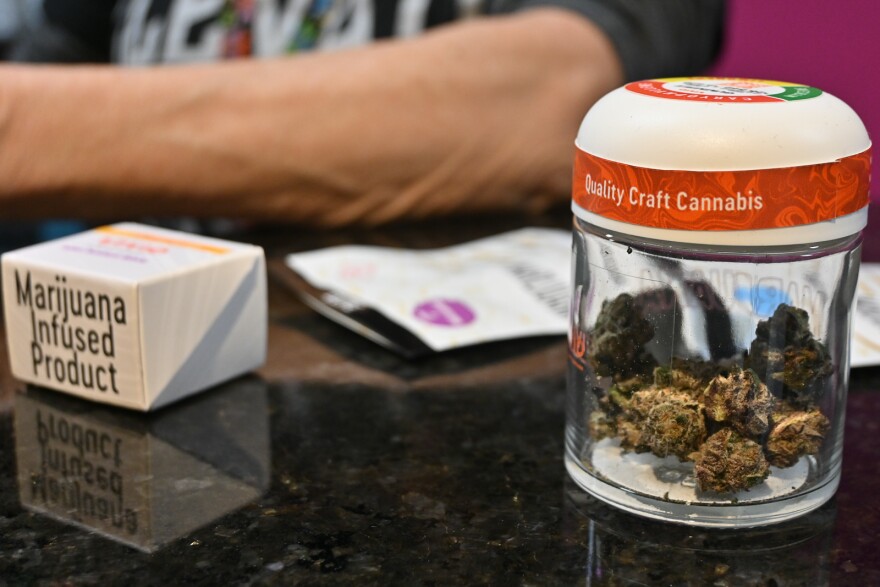Marijuana prices rose in many parts of Missouri on Oct. 1 as new local taxes took effect. Lawsuits filed in Buchanan and St. Louis counties argue that some of those taxes are illegal.
The constitutional amendment that legalized recreational cannabis sales included a 6% statewide excise tax and authorized local governments to charge a sales tax of up to 3%. The question now before the courts is whether the local taxes can be “stacked,” meaning a dispensary within the boundaries of an incorporated city must collect both a county-imposed tax and a tax authorized by a vote in the municipality, or if only the city tax applies.
In an Oct. 10 news release announcing the St. Louis lawsuit, the Missouri Cannabis Trade Association called the effort to collect both an “unconstitutional money grab” that violates the terms of the amendment passed in November.
“Today’s lawsuit should eventually put an end to Missouri adult-use marijuana customers having to pay stacked local taxes, which violate the Missouri Constitution and the will of the voters,” said Andrew Mullins, MoCann’s executive director.
Missourians are spending about $100 million a month on recreational marijuana, said Jack Cardetti, spokesman for the trade association. About three dozen counties have passed a local tax and the state Department of Revenue, which collects the tax for local entities, has notified dispensaries where a city and county tax is in effect that both levies must be charged.
“It equates to approximately $3 million a month that Missouri cannabis customers are being forced to pay when that is not what the constitution says,” Cardetti said.
Counties believe they have authority under the constitution to impose the tax, said Steve Hobbs, executive director of the Missouri Association of Counties.
“It is a very minimal amount and I think the law is very clear that the counties have the ability to do this,” Hobbs said.

Drafters of the amendment legalizing marijuana wanted to prevent stacking, so they used the broad term “local government” for the entity authorized to impose a tax. To make it apply to both cities and counties, the term was defined as meaning “a village, town, or city” for incorporated areas and applying to counties only for unincorporated places.
All dispensaries, whether selling marijuana for medical or recreational use, pay regular sales taxes. The full rate is the stacked combination of the 4.225% state tax and any local taxes, with retailers charging both county and city sales taxes at locations within municipal boundaries.
Users of medical marijuana pay an additional 4% that goes for state purposes and there is no authority for an extra local tax. Recreational users pay the standard sales tax, plus the 6% state tax and, where authorized by voters, 3% for local government programs.
Robust Missouri 3 LLC, operator of a dispensary in Florissant, sued after it was notified by the Department of Revenue that its sales tax rate for recreational marijuana sales would be 14.988%. That is the regular tax rate of 8.988% in Florissant plus the city and county marijuana sales tax.
Robust is suing the Department of Revenue and St. Louis County, seeking a court order blocking collection of the county tax.
The Department of Revenue declined to comment on the litigation.
If an injunction is not issued, the lawsuit states, Robust “will suffer irreparable harm by being required to collect sales tax from its customers above what is authorized by Article XIV of the Missouri Constitution, thereby permanently damaging those customer relationships.”
In Buchanan County, St. Joseph dispensary Vertical Enterprises sued Buchanan County Collector Peggy Campbell, arguing that it, too, would be “irreparably harmed” if both taxes were imposed.
Both lawsuits are in their early stages. A hearing to set a trial date for the Buchanan County case is scheduled for early December.
In the St. Louis case, Robust filed exhibits showing the revenue department has given conflicting guidance to local governments on the issue of stacking. In one notice from the Taxation Division, issued in February, the department said the constitution prohibits stacking the local marijuana taxes.
Both cities and counties can ask voters to authorize the tax, the notice states.
“However, the tax collected from a customer is limited to the percentage passed and is based on the location of the recreational marijuana business (facility) and depends on if that facility is in an incorporated or unincorporated area,” the notice states.
Later in the same month, the department reversed that guidance. The new notice from the Taxation Division stated that the section of the constitution authorizing the tax states that any successful tax vote is applicable to the “political subdivision” where it was enacted.
The amendment did not define “political subdivision,” the new notice stated.
“The distinction between local government and political subdivision is important as voters in the entire county will authorize the additional tax, not just voters in the unincorporated area,” the notice stated. “And practically, counties do not otherwise limit the applicability of their sales taxes based on geography.”
The Missouri Association of Counties lobbied for the revised guidance, Hobbs said.
“We had a discussion with them on why we felt like the ballot language, and the way it was worded, absolutely allowed the counties to put that tax on,” he said.
Counties should enjoy the new revenue from dispensaries located outside municipalities and the standard sales tax generated by all dispensaries within a county, Cardetti said.
“They are getting a portion of the sales because they are subject to the same sales tax as any other product,” he said.
Members of the trade association will collect both city and county marijuana taxes until the courts rule on stacking, Cardetti said.
How money would be refunded if the courts agree with the dispensaries is uncertain, he said.
“It is too early to tell,” he said. “I expect the order from the courts will be specific on that.”




